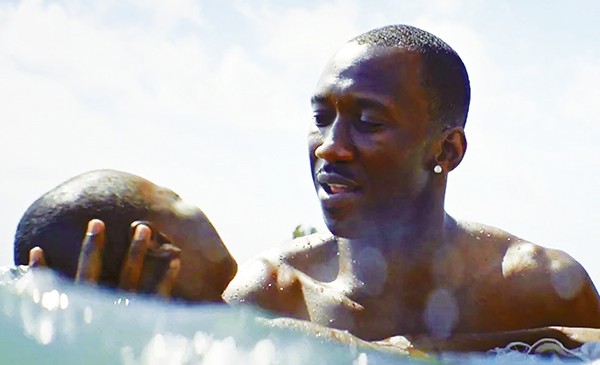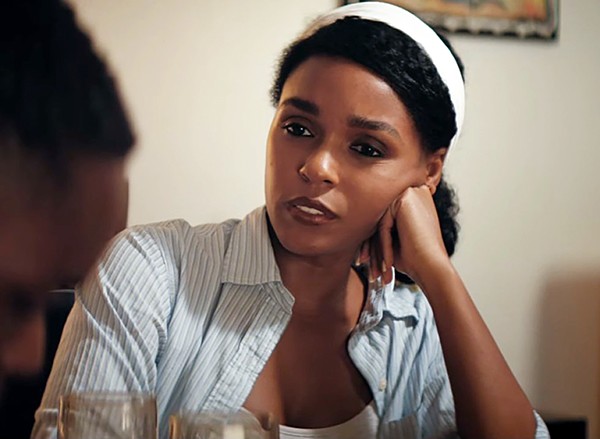Richard Linklater’s 2014 film Boyhood is rightly regarded as one of the 21st century’s masterpieces. It traces the story of one kid’s journey through adolescence, elevating the little details of life and change to epic storytelling by forcing us to look at them through the changing eyes of a boy trying to find his way in the world.
But Boyhood had some detractors who say the film’s “universal” experience of growing up isn’t really so universal, because the main character, Mason, is a white kid living in a predominantly white community in Texas. Make Mason an African American from a poor, urban neighborhood, and you’d have a vastly different movie, they say. Moonlight seems determined to prove that proposition.
I don’t really know what was in director Barry Jenkins’ head when he conceived of adapting the play In Moonlight Black Boys Look Blue, but the results speak for themselves. Jenkins’ lead character is Chiron, whom we first meet as a young boy living with his crack-addicted mother (Naomie Harris) in the Liberty City section of Miami. Shy and effeminate, Chiron is fleeing his classmate tormentors when he is rescued by Juan, a gangsta who finds his tough emotional exterior punctured by Chiron’s quivering vulnerability. Juan takes the terrified youngster back to his apartment where he and his girlfriend Teresa (Janelle Monáe) tend to the boy’s wounds and give him some food and compassion.

Mahershala Ali plays Juan with compassion in Barry Jenkins’ Moonlight.
One of Boyhood‘s great selling points was its audacious experimental side. Linklater shot his film over the course of 11 years, with his stars aging in real time. Moonlight is also formally audacious, but in a different way. It is divided into three sections, showing Chiron in three different stages of his young life, each played by a different actor. Act one is called “Little,” after the name Chiron is given by the bullies at school. The second is “Chiron,” where the character is played as a high schooler by Ashton Sanders. The title of this segment suggests that we are seeing our hero’s real self. Chiron is still being bullied at school, and his mother’s addictions have now spiraled out of control, but there is light in his world, too. His relationship with Teresa continues to be a positive in his life, even as Juan is now out of the picture. And he has some friends, the closest of whom is Kevin (Jharrel Jerome). One day, while sharing a blunt on the beach, Kevin and Chiron’s friendship bubbles over into something more carnal. For a moment, it seems Chiron may have a sort of happiness that has eluded him all of his life. But then comes a betrayal that seems as inevitable as it does tragic, and brutal violence. For the third act, set 10 years later, Chiron is played by Trevante Rhodes, a former college track-and-field athlete whose supple brawn instantly speaks volumes about where Chiron, now known as Black, has found himself — hardened against the world, but utterly alone, with neither the love of his family nor the comfort of a lover.
Bringing three actors of such varying ages together to create a single, believable, and deeply sympathetic character is only the beginning of Jenkins’ achievement. He takes Monáe, a powerhouse singer and visionary afrofuturist musician, and transforms her into the film’s lone source of quiet empathy. The cinematography is both subtle and deeply visceral, transitioning from fluid, expressive Steadicam swoops to Kubrickian tableaus at will. One long crossfade between Black’s car rolling down the interstate and the waves rolling in on a Florida beach creates the momentary illusion that he’s driving on water, and it has not been far from my mind since I saw Moonlight.

Musician Janelle Monáe is unrecognizable as Theresa, a woman who treats the unfortunate Chiron with compassion in Moonlight.
The whole package is pulled together by the best musical score I’ve heard all year, created by composer Nicholas Britell, who previously scored Twelve Years a Slave. Britell combines the hip-hop that surrounds Chiron with twelve-tone, modernist classical to create a fresh, original soundscape. Combined with Jenkins’ sweeping visual lyricism, they create a synergy rarely seen outside Spielberg/Williams collaborations.
Moonlight is an achingly beautiful film of tragedy, love, and yearning. Its themes of growing up and finding yourself among a kaleidoscope of shifting identities seems particularly necessary in this moment when kindness and compassion seem to be in short supply. As the saying goes, “Be kind, for everyone you meet is fighting a hard battle.”